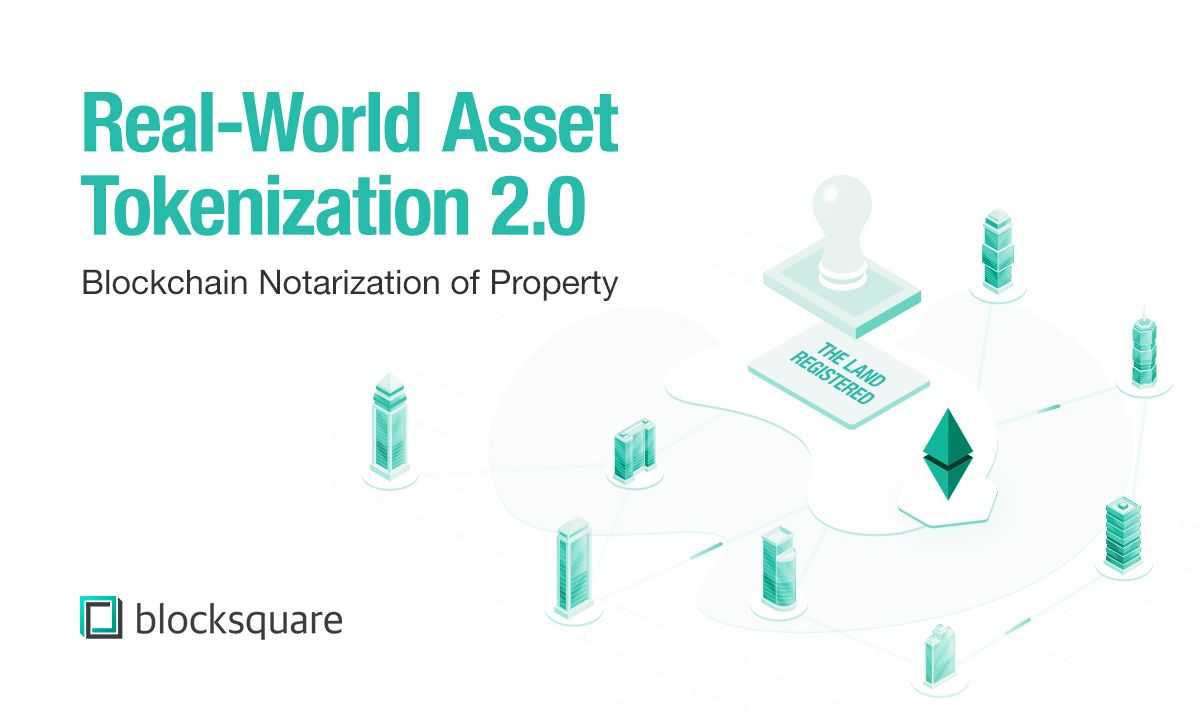Real-World Asset tokenization 2.0: Established Bridge Between Blockchain and Land Registry
How Blocksquare has successfully merged on-chain and off-chain building blocks in the property tokenization process, executing the first ever notarization of a tokenized real estate asset and registering it into the national land registry of a EU member country.


Real-world asset tokenization: challenges
Real-world assets (RWA) and blockchain may initially appear as if they're from different universes. However, through tokenization---a process where the economic, ownership, and other rights of these assets are converted into transferable digital tokens on a blockchain---a bridge between these two realms is formed.
It's crucial to understand that not all RWAs and the rights derived from them are identical. Similarly, the level of protection required for token holders varies, ensuring their rights associated with these tokens are legally and efficiently safeguarded. Token holders face a myriad of risks, ranging from technological challenges like blockchain network failures and cyber threats such as hacking, to traditional risks like fraudulent actions by real estate owners.
This risk exposure, particularly the threat of deceitful behavior from a contractual partner, isn't exclusive to the digital domain. Regrettably, it's often "business as usual" in conventional, analog commerce. This reality prompted the legal system to implement protective measures for parties vulnerable to such risks.
Take the real estate sector as an example---it's a heavily regulated industry. Any real estate transaction mandates a notarized agreement. Third-party rights that might impede the transferability of real estate must be documented in the land registry. The principle of "high value, high risk" underpins such legislative precautions. Only when these protective measures are aptly employed do they provide near-impervious protection for real estate buyers, lenders, and other parties entering commercial agreements with real estate owners, especially when the property serves as collateral.
From the "off-chain" vantage point, the legal framework shielding buyers (and other stakeholders) from unscrupulous real estate owners is evident. But how can we extend this same level of legal protection to token holders? Can we harmonize "on-chain" and "off-chain" safeguards to guarantee maximum protection for token holders? And is it feasible to devise a solution that transcends jurisdictional boundaries?
These are the quandaries Blocksquare has diligently tackled over the years. Today, we can confidently affirm that our answer to each of these questions is a resounding "yes."
Corporate Resolution
Our journey began with two foundational questions:
- How can we deter a real estate owner from disposing of tokenized real estate in a manner that would breach commitments to token holders?
- If prevention isn't entirely possible, how can we make such malicious actions prohibitively costly for the real estate owner?
Our initial stride towards this objective involved establishing the "rules of engagement" between the real estate owner and the token holders, who are essentially purchasers of tokenized economic rights derived from the property. To achieve this, we employed a corporate resolution tailored to complement our unique tokenization standard. This resolution is a formal proclamation made by a company's legal representatives or shareholders. It delineates the company's stance on the rights accorded to token holders and its obligations to them.
Key components of this resolution include:
- Revenue Share Model: A pledge to allocate all revenues from the tokenized real estate to the token holders.
- Assignment Clause: This mandates that in the event of a title ownership transition, the incoming owner or shareholder will be subject to the same corporate resolution.
- Mandatory Token Repurchase Clause: This binds the company to buy back all outstanding tokens prior to revoking the corporate resolution. It also outlines the specifics of this repurchase process, such as the minimum token price, notification procedures for token holders, and the "squeeze out principle."
- Conflicting Resolutions Clause: This nullifies any past or future resolutions that clash with this resolution, especially those that might challenge or undermine its content, either directly or indirectly.
- Valuation Report Obligation: This compels the owner to procure a real estate valuation report every 12 months, ensuring its accessibility to all token holders.
We're convinced that such a corporate resolution holds greater weight and is more enforceable than a mere company declaration. This suggests that Blocksquare can tokenize and distribute economic rights exclusively for real estate assets held by legal entities. However, we encounter constraints when the property is registered under an individual's name.
Loan and Collateral
One inherent challenge with a corporate resolution is its potential vulnerability. Even with its protective clauses, there's no absolute guarantee that the company owning the real estate asset will fully honor it. Such discretion poses a significant risk to investors. Imagine a scenario where tokens have been issued, the initial corporate resolution adopted, and tokens purchased. If, for unforeseen business reasons, the company fails to uphold the resolution, either partially or entirely, it could compromise the economic and legal standing of every token holder. This could necessitate legal action against the property owner, potentially leading to protracted and expensive litigation.
This predicament underscores the need for added measures to fortify the position of token holders.
To bolster the protection of token holders---ensuring that any breach of the corporate resolution by the real estate owner becomes either too challenging or costly---we've instituted a loan agreement. This agreement is between the marketplace operator (in this case, Blocksquare) and the real estate asset owner. Here, Blocksquare serves as the issuer and lender of Blocksquare Property Tokens (BSPTs---tokens designated for a specific real estate transaction), while the real estate owner assumes the role of the borrower.
The loan's essence is the BSPTs. The borrower pledges the property as collateral, enabling a charge to be placed on its title in favor of the lender. This loan agreement is notarized and subsequently registered with the Land Registry.
Its pivotal provisions include:
-
Subject of the Loan: For instance, 100,000 BSPT tokens (or amount being issued in specific tranche).
-
Disbursement and Loan Purpose: BSPT tokens are directly transferred to the wallets of prospective token holders. The loan's sole intent is the distribution of BSPTs to these buyers.
-
Repayment Date: Triggered either by a lender's call in the event of a breach by the borrower---whether of the loan agreement or the corporate resolution---or a decade post the loan agreement's inception.
-
Repayment: Exclusively in BSPTs. Should the borrower fail to repay using BSPTs, a contractual penalty ensues, amounting to twice the estimated real estate value. For instance, if 100,000 BSTPs tokens equate to EUR 50,000, the penalty imposed on the borrower would be EUR 100,000.
-
Mortgage: For any outstanding loan, a mortgage is levied on the real estate, valued at twice the estimated property price.
In essence, this notarized loan agreement ensures:
- A mortgage is placed on the property. Until the loan is repaid, the borrower cannot transact with the real estate (e.g., sell it).
- Loan repayment is solely in BSPTs. If the owner doesn't buy back all tokens from token holders, the borrower remains indebted, and the property's mortgage persists.
- Alternatively, should the borrower opt for fiat money over BSPTs for loan repayment, a contractual penalty is activated. Consequently, token holders receive twice the tokenized real estate's value.
Bulletproof Protection for Token Holders
Through the measures described, Blocksquare has aptly integrated both "on-chain" and "off-chain" strategies, all aimed at safeguarding token holders. By anchoring the mortgage to the BSPT loan, we're confident that we've established the pinnacle of legal protection available.
Given that mortgages are recognized legal instruments in both civil and common law systems, we're also optimistic that our proposed legal framework for real estate tokenization can be universally applied. While some adjustments might be necessary to accommodate specific local legislative requirements, we believe its core principles are adaptable across all jurisdictions.
A Practical Dive: Notarizing the Tokenized Parking Space in Tech Park Ljubljana, Slovenia
To truly illustrate the practicality of our tokenization protocol, we turned our attention to a tangible asset: a single parking space within Tech Park Ljubljana.
Step 1: Selection and Valuation
The parking space, with its 6-12 month lease contracts, was identified as the perfect candidate to showcase Blocksquare's system in a real-world setting. A comprehensive re-evaluation of the property ensured that the 100,000 BSPT accurately mirrored the current real-world value of the space.
Step 2: Smart Contract Creation
A 'PropToken' smart contract was crafted. This standard Ethereum ERC-20 contract, with a defined maximum issuance, was enriched with unique information identifying the parking space. Transactional rules of our tokenization protocol ensure that only eligible (whitelisted) users who go through KYC on the Oceanpoint marketplace can transact with the tokens.
- Anyone can register to register as a user to purchase a piece of history in the making!
Step 3: Corporate Resolution
A Public Corporate Resolution was drafted and executed, detailing the rights and obligations associated with the tokenized parking space. This was signed by the legal representative of NDP, the managing company, solidifying the bond between the real-world asset's economic rights and their digital representation --- the smart contract.
Step 4: Token Issuance and Distribution
NDP, a local real estate management company, distributed the BSPT tokens already back in 2018 to a diverse group of investors. These tokens not only represented fractional ownership but also entitled holders to a share of the revenues consistently throughout the past 5 years.
- Today, revenues are distributed in DAI, while BSPT holders can also opt to stake them on Oceanpoint to boost their yields with BST.
Step 5: Notarization and Registration
This is where our groundbreaking approach truly shines! The BSPT loan agreement, which tied the parking space as collateral, was executed by Blocksquare as the lender and on the other side NDP as the borrower. A certified notary public authenticated the transaction, ensuring its legal recognition and enforcement. This added an extra layer of legal assurance to the tokenization process. The notary public then submitted this agreement to the court, and it was duly registered in the Land Registry. This step was crucial in ensuring that the digital representation (tokens) had a legally binding connection to the physical asset (parking space), marking a significant turning point for Blocksquare and the entire real estate industry.
"Our digital tokens have found a place in the Slovenian Land Register, overseen by the Supreme Court of the Republic of Slovenia. Achieving this through standard procedures proves that innovation can fit well within established systems." --- Peter Merc, CCO at Blocksquare
Conclusion
At its core, this pilot project transcends a mere tokenization process. It showcases the powerful fusion of digital innovation with real-world assets, granting investors a unique combination of security, clarity, and the steadfast foundation of legal notarization. The next frontier of real estate tokenization is here!